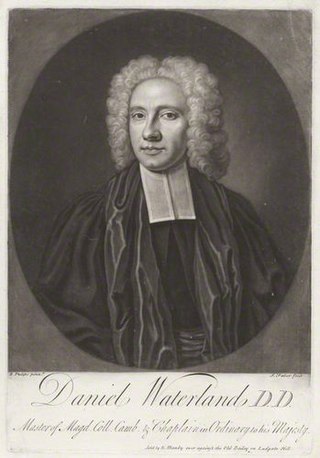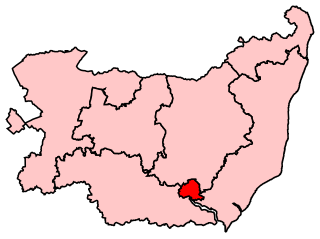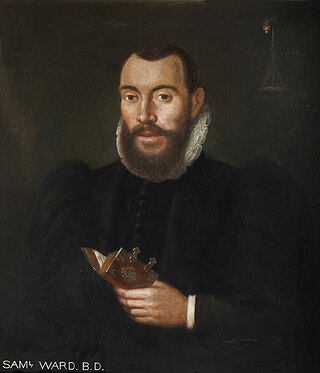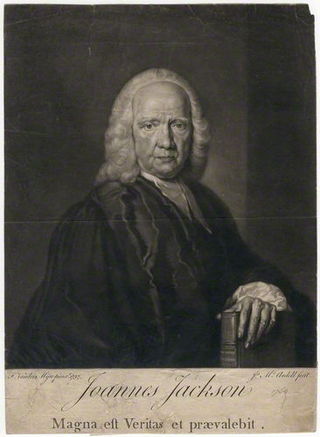Related Research Articles

Samuel Clarke was an English philosopher and Anglican cleric. He is considered the major British figure in philosophy between John Locke and George Berkeley. Clarke's altered, Nontrinitarian revision of the 1662 Book of Common Prayer continues to influence worship among modern Unitarians.

Daniel Waterland was an English theologian. He became Master of Magdalene College, Cambridge in 1714, Chancellor of the Diocese of York in 1722, and Archdeacon of Middlesex in 1730.

Ipswich is a constituency represented in the House of Commons of the UK Parliament since December 2019 by Tom Hunt of the Conservative Party.

Samuel Ward (1572–1643) was an English academic and a master at the University of Cambridge. He served as one of the delegates from the Church of England to the Synod of Dort.
The Ipswich Martyrs were nine people burnt at the stake for their Lollard or Protestant beliefs around 1515-1558. The executions were mainly carried out in the centre of Ipswich, Suffolk on The Cornhill, the square in front of Ipswich Town Hall. At that time the remains of the medieval church of St Mildred were used for the town's Moot Hall. Later, in 1645 Widow Lakeland was executed on the same site on the orders of Matthew Hopkins, the notorious Witchfinder General.

Cave Beck was an English schoolmaster and clergyman, the author of The Universal Character in which he proposed a universal language based on a numerical system.

Robert Abbot was an Anglican bishop, academic and polemical writer. He served as Master of Balliol College, Oxford, Regius Professor of Divinity, and Bishop of Salisbury from 1615. Among his four younger brothers, George became Archbishop of Canterbury and Maurice became Lord Mayor of London.

Samuel Ward (1577–1640) was an English Puritan minister of Ipswich.
James Bass Mullinger, sometimes known by his pen name Theodorus, was a British author, historian, lecturer and scholar. A longtime university librarian and lecturer at St. John's College, Cambridge, Mullinger was the author of several books detailing the college's history and similar academic subjects. He was also a contributor to many periodicals of the Victorian era, most especially, Cambridge History of Modern Literature, the Dictionary of National Biography and Encyclopædia Britannica.
Samuel Bourn the Younger was an English dissenting minister. He was an English presbyterian preaching on protestant values learned from the New Testament. Through his published sermons, he entered the theological debate that flourished around the Arian controversy, and the doctrinal question as to Man's essential nature. He contested the Deism of the Norwich rationalists in the early enlightenment, and challenged the Trinitarian conventional wisdoms about the seat of humanity and its origins.

John Jackson (1686–1763) was an English clergyman and controversial theological writer.
William Smarte, of Ipswich, Suffolk, was an English merchant and landowner.

Samuel Shenton was a building contractor, architect and politician in Ipswich, Queensland, Australia. He was mayor of Ipswich. A number of the buildings he designed are listed on the Queensland Heritage Register.
Roger Kelke (1524–1576) was an English churchman and academic, a Marian exile and Master of Magdalene College, Cambridge from 1558 and Archdeacon of Stow from 1563.

Allin Congregational Church is an historic United Church of Christ church in Dedham, Massachusetts. It was built in 1818 by conservative breakaway members of Dedham's First Church and Parish in the Greek Revival style.
Dr. John Marcus Blatchly MBE FSA was a schoolmaster, author and noted historian of the county of Suffolk.

The Town Library of Ipswich is a collection of 871 titles organised in 944 volumes published between 1474 and 1760. In addition there are 10 manuscripts. This collection was made by the Ipswich Corporation to provide resources for the Ipswich Town Preacher. It is now located in the headmaster's study at Ipswich School, where they are cared for on behalf of the town. As distinct from the St James Library which had more limited access in nearby Bury St Edmunds, it was open to all freemen of the Ipswich Corporation.
Ferdinando Adams was a shoemaker and churchwarden in Ipswich who was excommunicated from the Anglican Church in 1636. Clement Corbet, Chancellor of Diocese of Norwich complained Matthew Wren, Bishop of Norwich that “There be too many Adames in that towne, both Ecclesiasticks and Laickes”. Adams emigrated with his wife Ann to New England, settling in Dedham, Massachusetts. Adams settled in Dedham in 1637.
References
- 1 2 Mullinger, James Bass (1892). . In Lee, Sidney (ed.). Dictionary of National Biography . Vol. 30. London: Smith, Elder & Co.
- ↑ Clarke, G. R. (1830). "The history and description of the town and borough of Ipswich". S. Piper. p. 343. Retrieved 19 May 2024.
- ↑ Blatchly, John. The Town Library of Ipswich. Woodbridge: Boydell Press. p. 177. ISBN 0851155170.